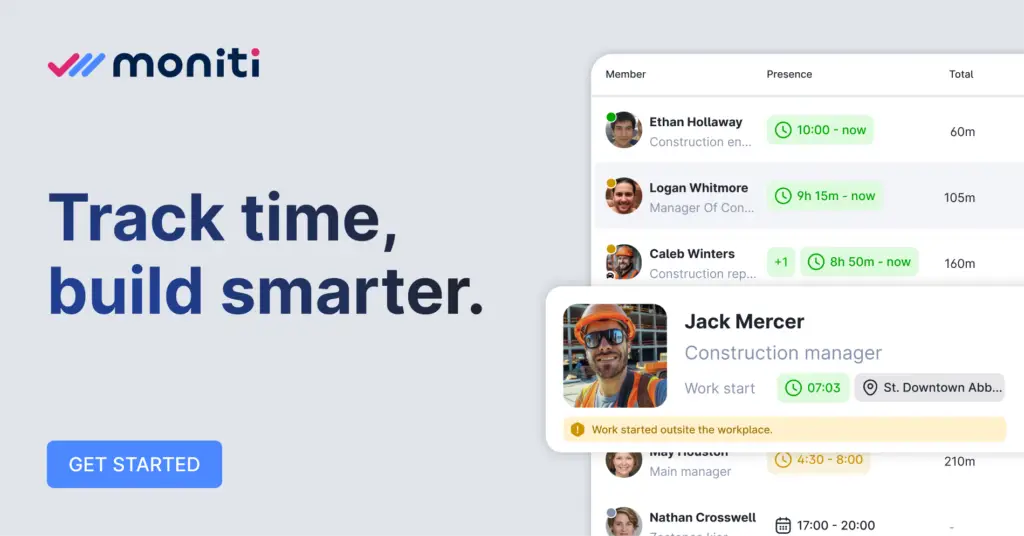Table of Contents
What are the biggest work time management mistakes in construction?
Work time management is critical for construction teams, as delays can lead to increased costs, frustrated clients, and lost opportunities. Despite this importance, many construction projects face common pitfalls that disrupt timelines and reduce overall productivity. By identifying and addressing these issues, project managers can ensure smoother workflows and successful project outcomes. Below are the seven biggest mistakes in managing work time for construction teams and strategies to overcome them.
1. Poor project planning
One of the most significant mistakes is starting a project without a well-defined plan. A lack of detailed planning can cause overlapping tasks, resource shortages, and chaotic workflows.
The Solution:
- Break projects into smaller, manageable tasks with clear milestones.
- Use tools like Gantt charts or project management software to visualize timelines.
- Define responsibilities and allocate resources efficiently to avoid delays.
Thorough project planning allows teams to anticipate potential challenges and establish realistic schedules.
2. Ineffective communication
Miscommunication among team members, contractors, and stakeholders is a common cause of time loss in construction projects. Unclear instructions or outdated information often lead to errors and rework.
The Solution:
- Implement daily stand-up meetings to keep everyone aligned.
- Use collaboration tools like Slack, Microsoft Teams, or project-specific apps to share updates.
- Centralize project documentation to ensure all team members access the latest information.
Clear and frequent communication minimizes misunderstandings and keeps tasks on track.
3. Underestimating project scope and timelines
Many projects suffer delays because managers underestimate the time required to complete tasks. This issue often results from a lack of detailed planning or a failure to assess past project data.
The Solution:
- Use historical project data to estimate realistic timelines for similar tasks.
- Build contingency time into the schedule to handle unforeseen issues.
- Regularly evaluate progress and adjust timelines as needed to maintain realistic goals.
Accurate scheduling ensures teams have sufficient time to complete their work effectively.
If you want to learn more about task delegation, read about one of our modules.
4. Lack of proper resource allocation
Improper allocation of personnel, equipment, or materials can lead to idle time and project delays. Overstaffing or understaffing specific tasks creates inefficiencies.
The Solution:
- Assign skilled workers to tasks that align with their expertise.
- Schedule equipment usage to prevent conflicts or downtime.
- Monitor material availability and delivery schedules to avoid interruptions.
Effective resource management ensures smooth progress across all phases of the project.
5. Ignoring time tracking and productivity monitoring
Without proper time tracking, it is difficult to measure productivity or identify areas where teams are losing time. Managers often overlook the importance of analyzing how time is spent.
The Solution:
- Use time-tracking tools like Moniti to monitor work hours.
- Track productivity metrics like task completion rates and resource utilization.
- Identify inefficiencies and take corrective action to improve workflows.
By analyzing time spent on tasks, project managers can make data-driven decisions to enhance productivity.
If you want to say goodbye to paper attendance sheets, be sure to read about our digital solution.
6. Failing to anticipate and mitigate risks
Unexpected challenges, such as weather disruptions, equipment breakdowns, or supply chain delays, often disrupt construction schedules. Failing to plan for these risks can lead to significant setbacks.
The Solution:
- Conduct risk assessments at the beginning of each project to identify potential challenges.
- Develop contingency plans to address delays caused by unexpected events.
- Monitor progress in real-time to respond proactively to emerging risks.
Proactive risk management ensures projects stay on schedule, even when unforeseen challenges arise.
7. Overlooking the importance of real-time monitoring
In large-scale construction projects, managers often rely on outdated progress reports, which delay decision-making. A lack of real-time monitoring prevents teams from addressing issues quickly.
The Solution:
- Implement real-time project monitoring systems to track progress as it happens.
- Use tools like Moniti to gather insights into time usage and task completion.
- Conduct regular reviews to identify areas where schedules need adjustments.
Real-time visibility allows managers to make quick, informed decisions to prevent delays and inefficiencies.
If you want to say goodbye to paper attendance sheets, be sure to read about our digital solution.
How can effective time management transform your construction projects?
Effective time management is essential for delivering construction projects on schedule and within budget. By avoiding common mistakes like poor planning, ineffective communication, and failing to monitor progress, project managers can significantly improve efficiency and productivity.
Tools like Moniti provide a powerful solution for tracking time, monitoring productivity, and identifying inefficiencies. With Moniti’s real-time insights, managers can make data-driven decisions to optimize workflows, allocate resources efficiently, and ensure every hour counts toward project success.
Whether managing small teams or large-scale construction projects, implementing these strategies will help you streamline operations, reduce delays, and achieve better results. Start improving your team’s time management today with smart tools and proven practices.





